小学六年级英语一般将来时四个句型
2023年小学英语六年级小升初语法总复习(四)一般将来时 (译林版含答案)
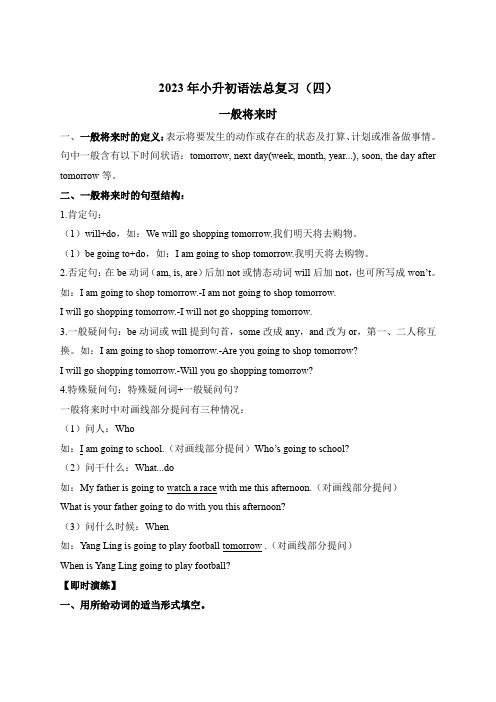
2023年小升初语法总复习(四)一般将来时一、一般将来时的定义:表示将要发生的动作或存在的状态及打算、计划或准备做事情。
句中一般含有以下时间状语:tomorrow, next day(week, month, year...), soon, the day after tomorrow等。
二、一般将来时的句型结构:1.肯定句:(1)will+do,如:We will go shopping tomorrow.我们明天将去购物。
(1)be going to+do,如:I am going to shop tomorrow.我明天将去购物。
2.否定句:在be动词(am, is, are)后加not或情态动词will后加not,也可所写成won’t。
如:I am going to shop tomorrow.-I am not going to shop tomorrow.I will go shopping tomorrow.-I will not go shopping tomorrow.3.一般疑问句:be动词或will提到句首,some改成any,and改为or,第一、二人称互换。
如:I am going to shop tomorrow.-Are you going to shop tomorrow?I will go shopping tomorrow.-Will you go shopping tomorrow?4.特殊疑问句:特殊疑问词+一般疑问句?一般将来时中对画线部分提问有三种情况:(1)问人:Who如:I am going to school.(对画线部分提问)Who’s going to school?(2)问干什么:What...do如:My father is going to watch a race with me this afternoon.(对画线部分提问)What is your father going to do with you this afternoon?(3)问什么时候:When如:Yang Ling is going to play football tomorrow .(对画线部分提问)When is Yang Ling going to play football?【即时演练】一、用所给动词的适当形式填空。
六年级英语-一般将来时(含练习题)
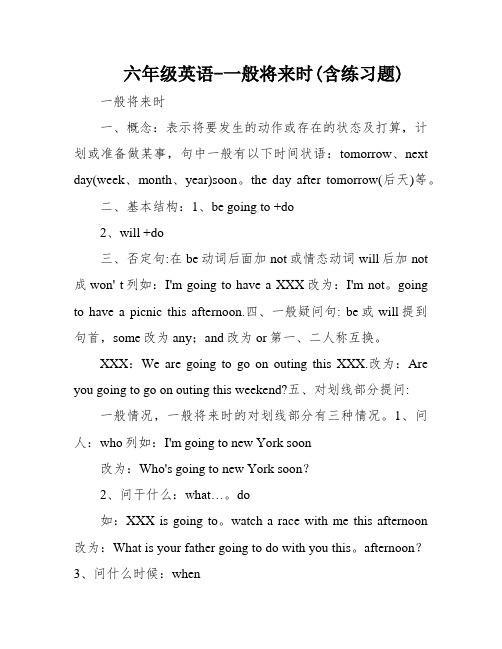
六年级英语-一般将来时(含练习题)一般将来时一、概念:表示将要发生的动作或存在的状态及打算,计划或准备做某事,句中一般有以下时间状语:tomorrow、next day(week、month、year)soon。
the day after tomorrow(后天)等。
二、基本结构:1、be going to +do2、will +do三、否定句:在be动词后面加not或情态动词will后加not 成won' t列如:I'm going to have a XXX改为:I'm not。
going to have a picnic this afternoon.四、一般疑问句: be或will提到句首,some改为any;and改为or第一、二人称互换。
XXX:We are going to go on outing this XXX.改为:Are you going to go on outing this weekend?五、对划线部分提问: 一般情况,一般将来时的对划线部分有三种情况。
1、问人:who列如:I'm going to new York soon改为:Who's going to new York soon?2、问干什么:what…。
do如:XXX is going to。
watch a race with me this afternoon 改为:What is your father going to do with you this。
afternoon?3、问什么时候:when列如:She's going to go to bed at nine 改为:When is going to bed?六、同义句:。
六年级英语一般将来时讲解加练习
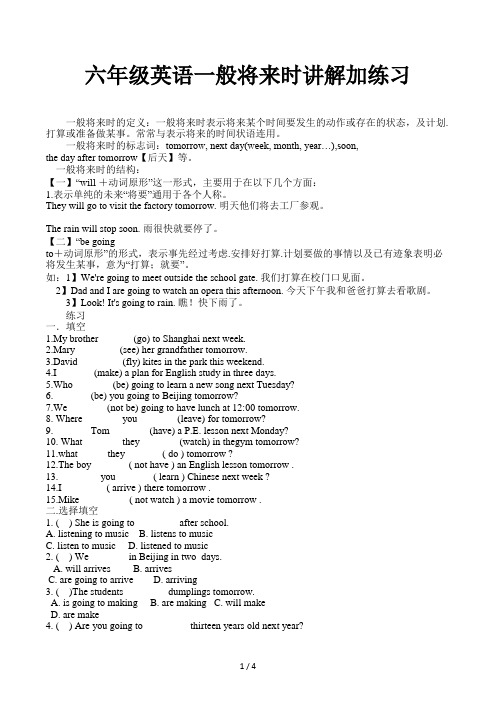
六年级英语一般将来时讲解加练习一般将来时的定义:一般将来时表示将来某个时间要发生的动作或存在的状态,及计划.打算或准备做某事。
常常与表示将来的时间状语连用。
一般将来时的标志词:tomorrow, next day(week, month, year…),soon,the day after tomorrow【后天】等。
一般将来时的结构:【一】“will +动词原形”这一形式,主要用于在以下几个方面:1.表示单纯的未来“将要”通用于各个人称。
They will go to visit the factory tomorrow. 明天他们将去工厂参观。
The rain will stop soon. 雨很快就要停了。
【二】“be goingto+动词原形”的形式,表示事先经过考虑.安排好打算.计划要做的事情以及已有迹象表明必将发生某事,意为“打算;就要”。
如:1】We're going to meet outside the school gate. 我们打算在校门口见面。
2】Dad and I are going to watch an opera this afternoon. 今天下午我和爸爸打算去看歌剧。
3】Look! It's going to rain. 瞧!快下雨了。
练习一.填空1.My brother ______ (go) to Shanghai next week.2.Mary ________ (see) her grandfather tomorrow.3.David ________ (fly) kites in the park this weekend.4.I_______ (make) a plan for English study in three days.5.Who _______ (be) going to learn a new song next Tuesday?6._______ (be) you going to Beijing tomorrow?7.We _______ (not be) going to have lunch at 12:00 tomorrow.8. Where _______ you _______ (leave) for tomorrow?9._______ Tom _______ (have) a P.E. lesson next Monday?10. What _______ they _______ (watch) in thegym tomorrow?11.what _____ they _______( do ) tomorrow ?12.The boy _______( not have ) an English lesson tomorrow .13.________ you _______( learn ) Chinese next week ?14.I ________ ( arrive ) there tomorrow .15.Mike _________ ( not watch ) a movie tomorrow .二.选择填空1. ( ) She is going to ________ after school.A. listening to musicB. listens to musicC. listen to musicD. listened to music2. ( ) We _______ in Beijing in two days.A. will arrivesB. arrivesC. are going to arriveD. arriving3. ( )The students ________ dumplings tomorrow.A. is going to makingB. are makingC. will makeD. are make4. ( ) Are you going to_________ thirteen years old next year?A. will beB. areC. beD. go5. ( ) ___will see a play in 5 days?A. WhenB. WhatC. WhoD. Whose6. ( ) Mary______ English next year.A. will learnB. will to learnC. are going to learn.D. learns7. ( ) He’ll _____ shopping this afternoon.A. goingB. goC. goesD. went8. ( ) Will you ____ at the bus stop at 10:30?A. meetingB. meetsC. meetD. met9. ( ) Lily and I _______ the guitar. next week.A. am going to playB. are going to playC. will playsD. play10. ( ) How ______ Jenny ___ home tomorrow?A. does......goB. is……goingC. will……goD. do……g o11. ( ) Who is going to _________ a song ?A. sings B singing C. to sing D. sing12. ( ) I _________in Beijing in three days.A. are going to arriveB. arriveC. will arriveD. arrives13. ( ) He _______some model planes tomorrow .A. going to makeB. is makingC. will make D makes14. ( ) Are you going to ___________a doctor next year ?A. will beB.. areC. beD. are going to15. ( ) She ________ you make supper this evening .A. helpsB. will helpC. is helpingD. is going help三.把下列句子变成一般疑问句,并给出肯定和否定回答。
六年级英语一般将来时(精心设计 实用)
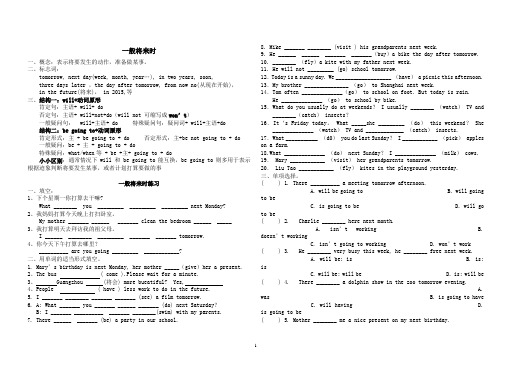
一般将来时一、概念:表示将要发生的动作,准备做某事。
二、标志词:tomorrow, next day(week, month, year…), in two years, soon,three days later ,the day after tomorrow, from now no(从现在开始),in the future(将来), in 2015,等三、结构一:will+动词原形肯定句:主语+ will+ do否定句:主语+ will+not+do(will not 可缩写成won’t)一般疑问句: will+主语+ do 特殊疑问句:疑问词+ will+主语+do结构二:be going to+动词原形肯定形式:主 + be going to + do 否定形式:主+be not going to + do 一般疑问:be + 主 + going to + do特殊疑问:what/when等 + be +主+ going to + do小小区别:通常情况下will 和 be going to能互换,be going to则多用于表示根据迹象判断将要发生某事,或者计划打算要做的事一般将来时练习一、填空:1、下个星期一你打算去干嘛?What ________ you _________ _________ _________ next Monday?2、我妈妈打算今天晚上打扫卧室。
My mother _______ ______ _______ clean the bedroom ______ _____3、我打算明天去拜访我的祖父母。
I ______ ________ _________ _______ _______ tomorrow.4、你今天下午打算去哪里?__________ are you going _________ ____________?二、用单词的适当形式填空。
1. Mary’s birthday is next Monday, her mother _____(give)her a present.2、The bus ( come ).Please wait for a minute.3、 Guangzhou (将会) more bueatiful? Yes,4、People ( have ) less work to do in the future.5. I _______ ________ _______ _______ (see) a film tomorrow.6. A: What _______ you _______ ______ _______ (do) next Saturday?B: I _______ __________ _______ ________(swim) with my parents.7. There ______ _______ (be) a party in our school. 8. Mike _______ ________ (visit ) his grandparents next week.9. He ______ ______ _______ _______(buy)a bike the day after tomorrow.10. ________ (fly)a kite with my father next week.11. He will not _________ (go) school tomorrow.12.Today is a sunny day. We ___________________ (have) a picnic this afternoon. 13.My brother _______________ (go) to Shanghai next week.14.Tom often ______________(go) to school on foot. But today is rain.He ______________ (go) to school by bike.15.What do you usually do at weekends? I usually ________ (watch) TV and ________(catch) insects?16.It‘s Friday today。
译林版英语六年级下册一般将来时的用法
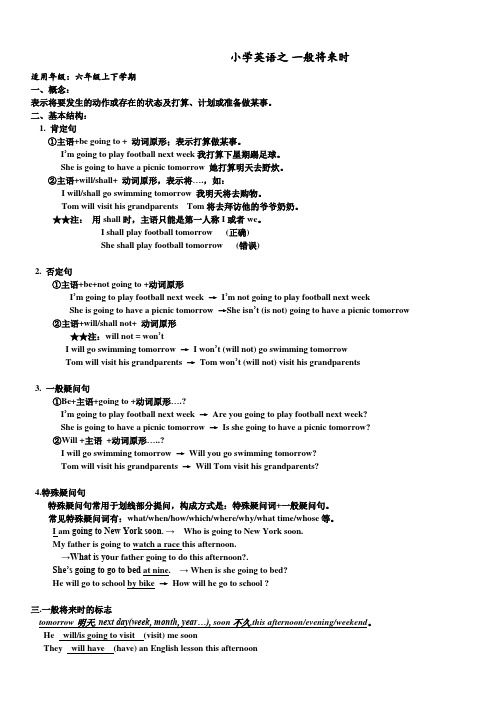
小学英语之一般将来时适用年级:六年级上下学期一、概念:表示将要发生的动作或存在的状态及打算、计划或准备做某事。
二、基本结构:1. 肯定句①主语+be going to + 动词原形;表示打算做某事。
I’m going to play football next week我打算下星期踢足球。
She is going to have a picnic tomorrow 她打算明天去野炊。
②主语+will/shall+ 动词原形,表示将….,如:I will/shall go swimming tomorrow 我明天将去购物。
Tom will visit his grandparents Tom将去拜访他的爷爷奶奶。
★★注:用shall时,主语只能是第一人称I或者we。
I shall play football tomorrow (正确)She shall play football tomorrow (错误)2. 否定句①主语+be+not going to +动词原形I’m going to play football next week →I’m not going to play football next weekShe is going to have a picnic tomorrow →She isn’t (is not) going to have a picnic tomorrow②主语+will/shall not+ 动词原形★★注:will not = won’tI will go swimming tomorrow →I won’t (will not) go swimming tomorrowTom will visit his grandparents →Tom won’t (will not) visit his grandparents3. 一般疑问句①Be+主语+going to +动词原形….?I’m going to play football next week →Are you going to play football next week?She is going to have a picnic tomorrow →Is she going to have a picnic tomorrow?②Will +主语+动词原形…..?I will go swimming tomorrow →Will you go swimming tomorrow?Tom will visit his grandparents →Will Tom visit his grandparents?4.特殊疑问句特殊疑问句常用于划线部分提问,构成方式是:特殊疑问词+一般疑问句。
小学英语人教版(PEP)六年级上册专项复习 一:一般将来时

游戏规则: 按要求每完成一项任务即可 获得相应的分数,满10分即可获得一个荣耀等 级,最高等级为最强王者。
一、概念: 一般将来时表示将要发生的动作或存在的状态及 打算、计划或准备做某事。句中一般有以下时间 状语:tomorrow, next day(week, month, year…), soon, the day after tomorrow(后天)等。
→ __W__il_l_y_o_u_r_f_a_t_h_e_r_g_o_h__ik_i_n_g_n__ex_t__S_u_n_d_a_y_?_____ ____Y_e_s_,_h_e_w__il_l_. _/ _N_o_,_h_e__w_o_n_'_t.______________
3. 对划线部分提问:(2.5分) 一般情况,一般将来时的对划线部分有五种情况。 ① 问人:Who I’m going to New York soon. → _W__h_o_’_s_g_o_i_n_g_t_o__N_e_w__Y_o_r_k_s_o_o_n_?_____________ ② 问干什么:What … do. My father is going to watch TV with me this afternoon. → W__h_a_t__is_y_o_u_r__fa_t_h_e_r_g_o_i_n_g_t_o_d_o__w_i_th__y_o_u_t_h_is__a_ft_e_r_n_o_o_n_?
考考你:变为一般疑问句并做回答 (2分) We are going to go on a picnic this weekend.
→ __A_r_e__y_o_u_g_o_i_n_g_t_o_g_o__o_n__a_p_i_c_n_ic__th__is_w__e_e_k_e_n_d_? ____Y__es_,_I_a_m__._/_N__o_, _I'_m__n_o_t_.________________ My father will go hiking next Sunday.
六年级-小学英语-一般将来时

2. Where(询问地点) 例: Where are you going this evening? 今天晚上你打算去哪里? I am going to the bookstore. 我打算去书店。
3. when(询问时间) 例: When are you going to buy the book? 你打算什么时候去买书? I am going at 5 o'clock. 我打算5点钟去。
is
is
+动词原形
“be going to + 动词原形”表将来 构成一般将来时态,表示计划要做的事或根据目 前推测将要发生的动作,意为“打算,将要”
I am going to buy a book. He is going to read a book. She is going to take a look. We are going to take a trip. They are going to play football.
I ______ going to …. You ________ going to …
are
am
He _______ going to …
She ______going to …
is Jack _______ going to … are My parents ______ going to … are Jack and Tom ________going to …
3.一般疑问句:Be+主语+going to+动词原形+将
来时间?
例:Are they going to read a book tonight ?
句型转换。 1.Mike is going to play football
六年级英语一般将来时句子及翻译

六年级英语一般将来时句子及翻译1、我明天要去上学。
I will go yo school tomorrow。
2、明天谁将要来那里? Who will e here tomorrow?3、下周会发生什么? What will happen in the following week?4、下次你将在哪里打篮球?Where will you play basketball next time?5、这封信明天将寄出去。
The letter will be sent tomorrow。
6、这天下午我们准备开班会。
We are going to have a class meeting this afternoon。
7、我将回答那个问题。
The question will be answered by me。
8、他不会那样做的。
He wont do that。
8、他不会那样做的。
He wont do that。
9、王教授稍后将会给我们展现。
Professor Wang will give us a presentation later。
10、我将过去帮你。
Im going to help you。
11、明天早.上我要去买些东西。
I am going to buy something tomorrow morning。
12、Look at the black clouds。
Its going to rain。
看那些乌云,快要下雨了。
13、我将去买一本书。
Im going to buy a book.14、九月份我将会返校。
I will e back to school in September。
15、你会明白这个问题的。
You will understand the quest ion。
16、明天我要去北京。
I will go to BeiJing tomorrow。
17、她准备这天下午去探望王先生。
She is going to see Mr。
新标准英语六年级下册时态专题复习—一般将来时

新标准英语六年级下册时态专题复习—一般将来时(有be,也有实义动词)一、基本含义:表示将要发生的动作或存在的状态。
句中一般有以下时间状语:tonight,in the future,tomorrow, next day(week, month, year…),soon, the day after tomorrow(后天),in+段时间(在...之后)等。
二、基本结构:①主语+be going to + do;②主语+will+ do.③主语(只能为I /We)+shall+do三、各种句型否定句:在①be动词(am, is, are)后加not;②will后加not成won’t;例如:I’m going to have a picnic this afternoon.→ I’m not going to have a picnic this afternoon.I will have a picnic this afternoon.→ I won’t have a picnic this afternoon.一般疑问句:be或will或shall提到句首,some改为any, and改为or,第一二人称互换。
例如:We are going to go for a walk this weekend.→ Are you going to go for a walk this weekend?We will go for a walk this weekend.→ Will you go for a walk this weekend?特殊疑问句(对划线部分提问):一般情况,一般将来时的对划线部分提问有三种情况。
1. 问人等提问主语。
Who 例如:I’m going to go to New York soon. →Who’s going to go to New York soon.I will go to New York soon. →Who will go to New York soon.2. 问干什么。
人教PEP版小学英语六年级上册一般将来时的表达方法
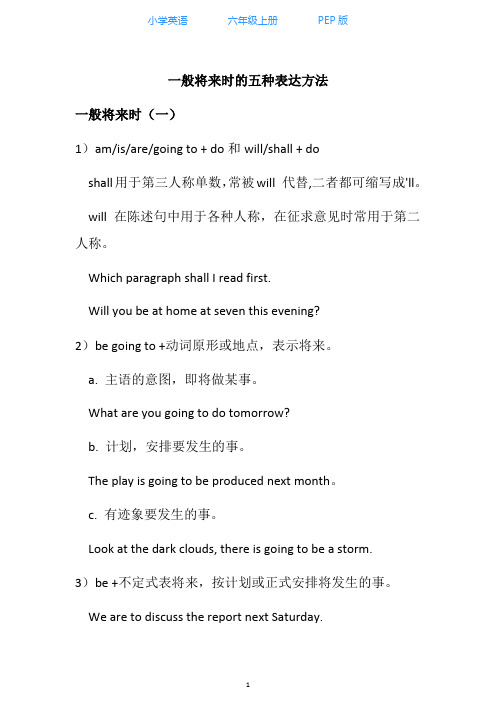
一般将来时的五种表达方法一般将来时(一)1)am/is/are/going to + do和will/shall + doshall用于第三人称单数,常被will 代替,二者都可缩写成'll。
will 在陈述句中用于各种人称,在征求意见时常用于第二人称。
Which paragraph shall I read first.Will you be at home at seven this evening?2)be going to +动词原形或地点,表示将来。
a. 主语的意图,即将做某事。
What are you going to do tomorrow?b. 计划,安排要发生的事。
The play is going to be produced next month。
c. 有迹象要发生的事。
Look at the dark clouds, there is going to be a storm.3)be +不定式表将来,按计划或正式安排将发生的事。
We are to discuss the report next Saturday.4)be about to +不定式,意为马上做某事。
He is about to leave for Beijing.注意:be about to 不能与tomorrow, next week 等表示明确将来时的时间状语连用。
一般将来时(二)1.一般将来时的基本概念一般将来时表示将来某一时刻的动作或状态,或将来某一段时间内经常的动作或状态。
一般将来时由助动词shall(第一人称),will(第二、三人称)+动词原形构成。
美国英语则不管什么人称,一律用will。
2.一般将来时的形式●will 常简略为'll,并与主语连写在一起,如:I'll,he'll,it'll,we'll,you'll,they'll。
新年计划英语作文使用六年级上册一般将来时句型
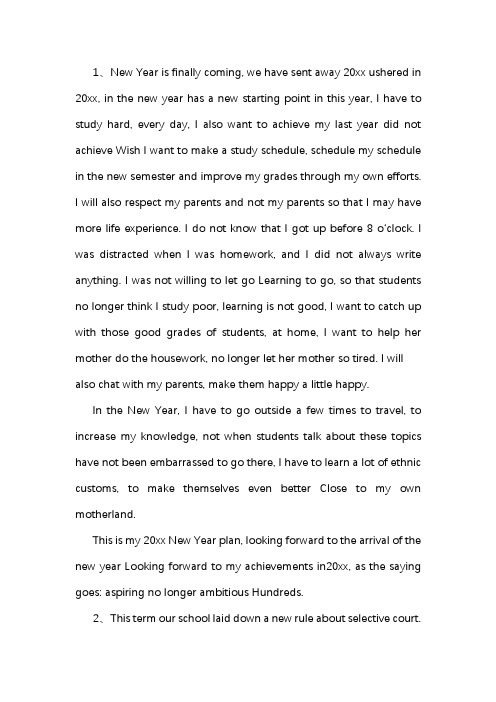
1、New Year is finally coming, we have sent away 20xx ushered in 20xx, in the new year has a new starting point in this year, I have to study hard, every day, I also want to achieve my last year did not achieve Wish I want to make a study schedule, schedule my schedule in the new semester and improve my grades through my own efforts.I will also respect my parents and not my parents so that I may have more life experience. I do not know that I got up before 8 o‘clock. I was distracted when I was homework, and I did not always write anything. I was not willing to let go Learning to go, so that students no longer think I study poor, learning is not good, I want to catch up with those good grades of students, at home, I want to help her mother do the housework, no longer let her mother so tired. I will also chat with my parents, make them happy a little happy.In the New Year, I have to go outside a few times to travel, to increase my knowledge, not when students talk about these topics have not been embarrassed to go there, I have to learn a lot of ethnic customs, to make themselves even better Close to my own motherland.This is my 20xx New Year plan, looking forward to the arrival of the new year Looking forward to my achievements in20xx, as the saying goes: aspiring no longer ambitious Hundreds.2、This term our school laid down a new rule about selective court.For the first two weeks, we may sit in as many classes as we like before we decide on which courses to choose. We jumped for joy. The first week I attended classes for four evenings on end and found out that most of the teachers took it seriously. They were busy in "winning votes" for fear, that later on no one would attend their lectures.For example, the teacher of Modern Literature of Taiwan said, "Actually the first two hours of my lecture were only a prelude. The real contents have not been involved. In the furor, we shall discuss such famous writers as Qigong Yao, Xi Muong, etc., and such famous actresses as Lin Feng Jiao, Lin Mingxia etc. We have lots of video-taped films to watch. These are confined only to those who co-major in this court." See, after all, the last sentence is the core of everything he said. The teacher of Appreciation and Critics of Modern Opera said, "We have a variety of contents andthe teaching method is changeable. For instance, l may choose one act from a play and let you perform it in class. If you do a good job, you can put on the play at the school theater festival. Also, we shall arrange for you to watch current plays. The school is in charge of the traffic and tickets, Of course, only those who co-major this course is eligible." You see, the most important thing comes at last through twists and turns.。
小学六年级英语一般将来时四个句型2篇
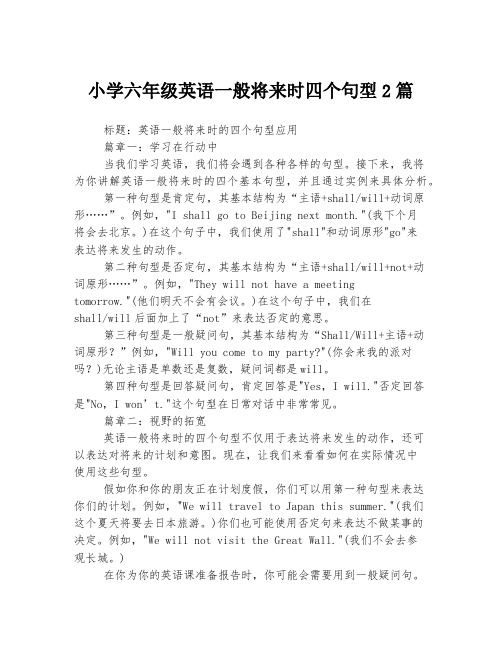
小学六年级英语一般将来时四个句型2篇标题:英语一般将来时的四个句型应用篇章一:学习在行动中当我们学习英语,我们将会遇到各种各样的句型。
接下来,我将为你讲解英语一般将来时的四个基本句型,并且通过实例来具体分析。
第一种句型是肯定句,其基本结构为“主语+shall/will+动词原形……”。
例如,"I shall go to Beijing next month."(我下个月将会去北京。
)在这个句子中,我们使用了"shall"和动词原形"go"来表达将来发生的动作。
第二种句型是否定句,其基本结构为“主语+shall/will+not+动词原形……”。
例如,"They will not have a meeting tomorrow."(他们明天不会有会议。
)在这个句子中,我们在shall/will后面加上了“not”来表达否定的意思。
第三种句型是一般疑问句,其基本结构为“Shall/Will+主语+动词原形?”例如,"Will you come to my party?"(你会来我的派对吗?)无论主语是单数还是复数,疑问词都是will。
第四种句型是回答疑问句,肯定回答是"Yes,I will."否定回答是"No,I won’t."这个句型在日常对话中非常常见。
篇章二:视野的拓宽英语一般将来时的四个句型不仅用于表达将来发生的动作,还可以表达对将来的计划和意图。
现在,让我们来看看如何在实际情况中使用这些句型。
假如你和你的朋友正在计划度假,你们可以用第一种句型来表达你们的计划。
例如,"We will travel to Japan this summer."(我们这个夏天将要去日本旅游。
)你们也可能使用否定句来表达不做某事的决定。
例如,"We will not visit the Great Wall."(我们不会去参观长城。
- 1、下载文档前请自行甄别文档内容的完整性,平台不提供额外的编辑、内容补充、找答案等附加服务。
- 2、"仅部分预览"的文档,不可在线预览部分如存在完整性等问题,可反馈申请退款(可完整预览的文档不适用该条件!)。
- 3、如文档侵犯您的权益,请联系客服反馈,我们会尽快为您处理(人工客服工作时间:9:00-18:30)。
一、肯定句——主语+ be +going to do
主语+will do
be动词包括:am,are,is
例. I am going to play football tomorrow. 我明天将要踢足球。
I will play football tomorrow.
=I plan to play football tomorrow.
He is going to watch TV tomorrow morning. 他明天早上打算看电视。
He will watch TV tomorrow morning.
=He plans to watch TVtomorrow morning.
She is going to visit her teacher next week. 她下周要去探望她老师。
She will visit her teacher next week.
=She plans to visit her teacher next week.
练习:1.他今晚计划读书。
二、否定句——主语+be +not +going to do
主语+will +not +do
例.I am not going to play football tomorrow.
I will not going to play football tomorrow.
He is not going to watch TV tomorrow morning.
He will not watch TV tomorrow morning.
练习:
三、一般疑问句——Be +主语+going to do
Will +主语+do
提示:一般疑问句就是把肯定句中的be和will放在句首
例.Are you going to play football tomorrow?
Will you play football tomorrow?
Is he going to watch TV tomorrow morning?
Will he watch TV tomorrow morning?
Is she going to visit her teacher next week?
Will she visit her teacher next week?
练习:
四、特殊疑问句——疑问词+be +主语+going to do
疑问词+will +主语+do
疑问词包括:what,when,how,where,why
提示:特殊疑问句=疑问词+一般疑问句——先确定用哪个疑问词
例.What are you going to do tomorrow? What will you do tomorrow?
When are you going to watch TV? When will you watch TV?
Where are you going tomorrow? Where will you go tomorrow?
Why is she going to visit her teacher? Why will she visit her teacher?。
